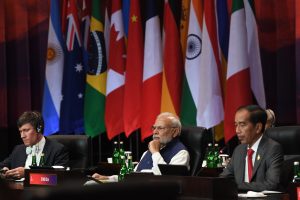Jagannath Panda

Days after the G-20 summit in Bali, which marked the end of the Indonesian presidency and heralded the group’s Indian leadership for the new term beginning in December, Indian Prime Minister Narendra Modi addressed his domestic audience about India’s “big opportunity” to “focus on global good.” This encapsulated the essence of his speech at the closing session of the summit in Indonesia, which linked India’s global ambitions of establishing a multipolar world and its growing projection as the leader of the Global South.
Thus, the overarching theme of India’s G-20 presidency will revolve around development (making the G-20 “a catalyst for global change”). This primarily involves facilitating the redistribution of global goods by enhancing sustainable partnerships between developed and developing countries, and also reinvigorating South-South cooperation.

:quality(100)/cloudfront-us-east-1.images.arcpublishing.com/thesummit/ZCTOEXDKP5FDNCVBC7BLADYPZQ.jpg)







:quality(100)/cloudfront-us-east-1.images.arcpublishing.com/thesummit/BNKHDNJE7ZG6FCBFQ7CKUJZFS4.jpg)

